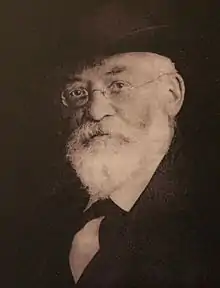Gustav Albert Peter
Gustav Albert Peter (21 August 1853, in Gumbinnen – 4 October 1937, in Göttingen) was a German botanist.

In 1874 he received his doctorate from the University of Königsberg, and later on, worked as a curator at the botanical garden in Munich. From 1888 to 1923 he was a professor at the University of Göttingen, where he also served as director of the botanical garden.[1]
From 1913 he 1919 he collected plants in German South-West Africa, South Africa and especially German East Africa, then later in 1925/26 he was engaged in another botanical expedition in Africa. In 1936 his herbarium of roughly 50,000 plants was acquired by the Berlin-Dahlem Botanical Garden and Botanical Museum.[2] The plant genus Peterodendron (family Achariaceae) was named in his honor by Hermann Otto Sleumer.[1]
Peter's daughter Hedwig was married to Leo Rosenberg.[3]
Published works
In the 1890s, he made contributions regarding the plant families Compositae, Convolvulaceae, Hydrophyllaceae and Polemoniaceae to Engler and Prantl's Die Natürlichen Pflanzenfamilien.[2] With Carl Nägeli he published a two-volume work on the genus Hieracium, titled Die Hieracien Mittel-Europas (Hieracium of Central Europe; 1885–89).[4] Other noted works by Peter include:
- Flora von Suedhannover nebst den angrenzenden Gebieten (Göttingen, 1901, 2 volumes) – Flora of southern Hanover and adjacent areas.
- Wasserpflanzen und sumpf gewachse in Deutsch-Ostafrika (Berlin, 1928) – Aquatic and marsh plants of German East Africa.
- Flora von Deutsch-Ostafrika (Berlin, 1929–38) – Flora of German East Africa.[2]
References
- BHL Taxonomic literature : a selective guide to botanical publications
- Peter, Prof Gustav Albert (botany) S2A3 Biographical Database of Southern African Science
- Schwab, Karl-Heinz; Grundmann, Stefan; Riesenhuber, Karl (2007). Deutschsprachige Zivilrechtslehrer des 20. Jahrhunderts in Berichten ihrer Schüler – Band 1 (in German). De Gruyter. pp. 373 ff. ISBN 978-3-89949-456-3.
- Die Hieracien Mittel-Europas OCLC WorldCat
- IPNI. Peter.
